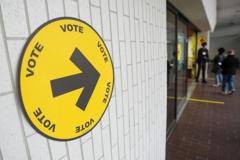This election is being shaped by a perfect storm of factors, including Trump's tariffs and divisive rhetoric, leading to an unpredictable political landscape.
Canada's Election Transformed by Trump: Voters Cast Ballots Amid Turmoil

Canada's Election Transformed by Trump: Voters Cast Ballots Amid Turmoil
Canadians head to the polls today in a historic election significantly influenced by US President Donald Trump.
In an election marked by unexpected twists, Canadians are voting today amidst heightened tensions fundamentally altered by US President Donald Trump.
The Conservative Party, once seen as the frontrunner to a decisive victory, has found its position precariously challenged by the unexpected resurgence of the Liberal Party led by Mark Carney. At the year's start, forecasts indicated a landslide win for the Conservatives; however, a series of tariffs and Trump’s provocative statements, like referring to Canada as a potential "51st state," have revitalized sentiments favoring nationalism and a defensive approach to sovereignty. Latest polling shows the Liberals might just be ahead, with Conservative leader Pierre Poilievre expressing confidence in a potential victory.
The election campaign wound down on a tragic note as it coincided with a heartbreaking incident in Vancouver where an SUV rammed into a crowd, killing at least 11 people during a Filipino festival. Carney halted his campaign to address the nation, while Poilievre took the opportunity to engage with the Filipino community in nearby Mississauga.
Trump's tariffs of 25% have served to deepen Canadian frustrations, leading to overt displays of national pride, including public booing of the US national anthem at hockey games. This recent election is not merely about parties and policies, but rather a reflection of how Canadian citizens feel pressured to respond to an aggressive foreign influence.
Carney has framed himself as the candidate best equipped to navigate these turbulent waters, drawing from his banking expertise during crises like the Great Recession and Brexit. He argues for re-establishing diplomatic ties with allies like the UK and EU, asserting that the old relations with the US have changed irrevocably.
As the Liberals and Conservatives clash, smaller parties are struggling for visibility. The NDP, led by Jagmeet Singh, may face losses, while the Bloc Québécois struggles to maintain relevance given the context of Trump's influence.
In the backdrop of heightened offense regarding Canadian sovereignty, the election remains dominated by the larger debate over the direction of the country in response to external pressures. President Trump’s administration has remained largely silent on the election, maintaining a tone of inevitability about Canada’s position under US influence.
With polls set to open shortly across the country, a record number of Canadians have already cast their votes early, demonstrating the urgency and significant stake in today’s election outcome.
The Conservative Party, once seen as the frontrunner to a decisive victory, has found its position precariously challenged by the unexpected resurgence of the Liberal Party led by Mark Carney. At the year's start, forecasts indicated a landslide win for the Conservatives; however, a series of tariffs and Trump’s provocative statements, like referring to Canada as a potential "51st state," have revitalized sentiments favoring nationalism and a defensive approach to sovereignty. Latest polling shows the Liberals might just be ahead, with Conservative leader Pierre Poilievre expressing confidence in a potential victory.
The election campaign wound down on a tragic note as it coincided with a heartbreaking incident in Vancouver where an SUV rammed into a crowd, killing at least 11 people during a Filipino festival. Carney halted his campaign to address the nation, while Poilievre took the opportunity to engage with the Filipino community in nearby Mississauga.
Trump's tariffs of 25% have served to deepen Canadian frustrations, leading to overt displays of national pride, including public booing of the US national anthem at hockey games. This recent election is not merely about parties and policies, but rather a reflection of how Canadian citizens feel pressured to respond to an aggressive foreign influence.
Carney has framed himself as the candidate best equipped to navigate these turbulent waters, drawing from his banking expertise during crises like the Great Recession and Brexit. He argues for re-establishing diplomatic ties with allies like the UK and EU, asserting that the old relations with the US have changed irrevocably.
As the Liberals and Conservatives clash, smaller parties are struggling for visibility. The NDP, led by Jagmeet Singh, may face losses, while the Bloc Québécois struggles to maintain relevance given the context of Trump's influence.
In the backdrop of heightened offense regarding Canadian sovereignty, the election remains dominated by the larger debate over the direction of the country in response to external pressures. President Trump’s administration has remained largely silent on the election, maintaining a tone of inevitability about Canada’s position under US influence.
With polls set to open shortly across the country, a record number of Canadians have already cast their votes early, demonstrating the urgency and significant stake in today’s election outcome.




















